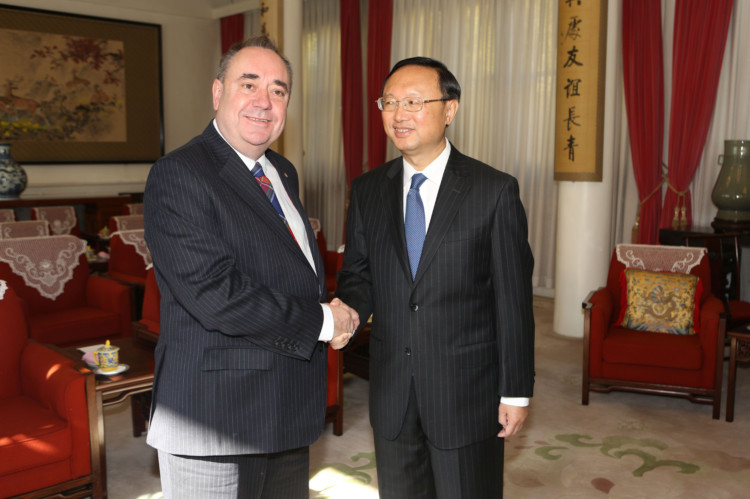
A dossier on Alex Salmond’s business trip to China last year has revealed just how much help he received from the UK Government.
Critics of his drive to independence claim the evidence that the British Ambassador opened important doors for the First Minister and briefed the business community travelling with him on the intricacies of doing business in China shows Scotland enjoys “the best of both worlds” as part of the UK.
And the news has emerged at a serendipitous point for the UK Government as the Foreign Office prepares to join the independence argument, the last of Whitehall’s big hitting departments to do so.
Labour’s Shadow Scottish Secretary Margaret Curran has garnered information on the China trip from Foreign Office and business ministers and via Freedom of Information laws.
Alex Salmond, so keen on keeping the Chinese sweet he refused to meet the Dalai Lama when Beijing’s bte noire was in the Scotland, headed east in November.
He returned having helped secure £40 million of business for Scottish firms as well as meeting key Chinese companies involved in North Sea exploration, oil and petrochemicals.
One of the most high profile deals inked saw an agreement to screen Scottish football live in China for the first time. But the Foreign Office documents reveal it was their UK bureaucrats who arranged the link-up between the football authorities and trade body Scottish Development International that led to that contract being signed.
The British embassy in Beijing also set up meetings with key Communist party officials and briefed the First Minister. Officials from UK Trade and Industry gave a presentation on the details of doing business with the Chinese to executives from the construction and oil industry companies on the trip.
Scottish Government sources stress that it was they who planned the entire visit and, more fundamentally, paid for it. But unionist politicians say the jaunt was a prime example of the Scottish and Westminster machines working together.
Margaret Curran said: “Scotland gets real advantages from being able to use the UK’s embassies and be advised by the expert staff who work there. Alex Salmond has shown how Scotland gets the best of both worlds he’s able to represent Scottish interests, while at the same time taking advantage of the UK’s strength and reputation abroad. Despite this, he’s willing to put this at risk with his plans for independence.”
William Hague’s Foreign Office is expected to echo that view when it launches an analysis paper on the cost of separation expected to be published within days.
Of the so-called Great Offices of State, the Foreign Office is the last to weigh into the independence debate in a meaningful way.
Its contribution is expected to be statistics heavily pointing out the current diplomatic network costs £1.6 billion to run and employs more than 14,000 people. The Scottish Government’s White Paper estimated the cost of running a separate, smaller set of embassies at no more than £120 million.
The analysis paper will set out estimates of how much a separate Scotland would be expected to pay to international bodies of which the UK is already a member. The UK pays £500 million to the United Nations at present.
A Foreign Office source said: “Scottish people right now have access to one of the most expansive and professional networks of embassies and trade bodies the world has to offer. Under the plans in the White Paper, Scots would have to make do with second best and we don’t want second best for Scotland.”
A spokesman for the Scottish Government said: “At present, Scotland has no formal voice on the international stage and no choice but to use additional UK diplomatic channels to help boost the economy through greater relations with economic powerhouses such as China.
“With independence, Scotland would gain this voice and have the opportunity to plan its own international engagements based on our well-developed relationships with countries such as China.
“An independent Scotland would build on our current strengths, formulating an overseas network that works better for Scotland’s economic priorities and is not based on an outdated imperial framework.”

Enjoy the convenience of having The Sunday Post delivered as a digital ePaper straight to your smartphone, tablet or computer.
Subscribe for only £5.49 a month and enjoy all the benefits of the printed paper as a digital replica.
Subscribe